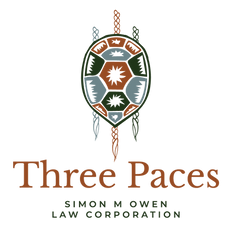

.jpg)
Who
Schooled in Canadian law, trained in Indigenous legal research, experienced in working across legal orders.
I spent a decade advocating for Indigenous clients in Canadian courts. Since 2015 I have been supporting Indigenous Peoples to revitalize and apply their own laws to solve problems and sustain relations within and across communities.
I believe that Indigenous laws offer the clearest paths forward from colonial modes of governance.
I am passionate about upholding and expanding spaces for Indigenous laws to do their work in a complex world.

What does it mean to take Indigenous law seriously?
I start with a basic truth: despite having been forced to define and defend themselves in colonial law, Indigenous Nations are inherently lawful. Indigenous laws are the principles, processes and institutions that guide diverse, self-determining Peoples through every challenge.
But standing up laws is hard work. There are pathways - both within and beyond Canadian legal frameworks - for this work to progress. There are also immense and subtle obstacles.
Lawyers can help on these journeys, but can also do harm. We must never presume to be experts in Indigenous laws. But we can - and we should - commit our skills to their authority, integrity and application.
What
Why
I've learned from many teachers who "walk in two worlds".
As a settler supporting Indigenous legal orders, this means being attentive to law's living roots - origins, traditions, and relationships across time and within deeply-known territories. It also means being attuned to continuing disruption and dispossession, resistance and resilience.
Indigenous laws are rebuilding within these two worlds. As they do, a third is emerging. In this world, diverse legal orders inform thriving conversations. Indigenous and Crown jurisdictions interact, adapt, and flourish in new ways.
Traditions, tensions, interconnections - all are important to the work of standing up Indigenous law. Each step is three paces.

Beliefs & Commitments
Transparency matters. What guides my work?
-
Indigenous laws are as diverse as the peoples and places they nurture. Their sources, resources and applications are expressions of inherent, responsible and responsive self-governance. Indigenous laws are upheld in legislation, agreements, daily practices and many other ways.
-
Indigenous legal orders - rooted, adaptable, and comprehensive - respond to the needs and aspirations of Indigenous citizenries. They include space for critical conversations, enquiry, debate, and difference. They are strong enough to handle conflicts.
-
Indigenous governance - elected, hereditary and other diverse forms - can support intensely democratic practices.
-
Indigenous governance - including gendered roles - can support gender equities, rights and freedoms.
-
Indigenous governance - including collective identities and responsibilities - can reflect, protect, and promote individual agency and well-being.
-
Indigenous legal orders - representing thousands of years of maintaining lawfulness within and between societies - must be central to the implementation of the UN Declaration and other reconciliation frameworks.

Working with law means working with values.
Put yours into practice.

.jpg)
Contact Me
I am a grateful guest on unceded Lək̓ʷəŋən and W̱SÁNEĆ territories. Living here is a privilege and responsibility.
Reciprocity Trusts is one small way I recognize this.
Areas of Practice
Belonging & Citizenship
Child & Family Wellness
Indigenous Human Rights
Interpersonal Harms
Relations with Water, Land & Other Beings
Relations with Other Governments